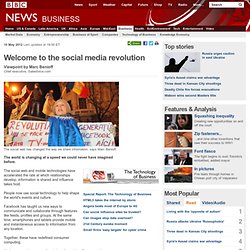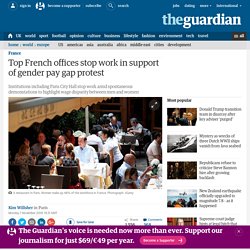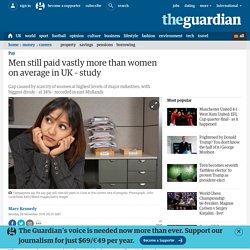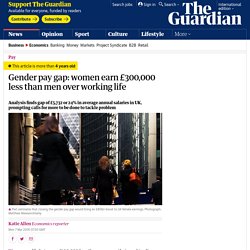

Welcome to the social media revolution. 10 May 2012Last updated at 19:00 ET Viewpoint by Marc Benioff Chief executive, Salesforce.com The social web has changed the way we share information, says Marc Benioff.

The world is changing at a speed we could never have imagined before. The social web and mobile technologies have accelerated the rate at which relationships develop, information is shared and influence takes hold. People now use social technology to help shape the world's events and culture. Facebook has taught us new ways to communicate and collaborate through features like feeds, profiles and groups. Women's Suffrage in the 20th Century.
Election fraud ignored in Muslim community in UK because of 'political correctness' - report. Top French offices stop work in support of gender pay gap protest. Staff at some of Paris’s most high-profile political and cultural offices stopped work at 4.34pm on Monday in solidarity with a protest against women being paid less than men.

Women’s rights campaigners at the feminist newsletter Les Glorieuses had urged female workers to down tools from that time. They suggested that doing so until the end of the year – in effect taking 38.2 days off – would highlight the global wage disparity that experts say will not disappear until 2186. Hijab-wearing Muslim women being passed over for jobs in last form of 'acceptable' discrimination – MPs Black lawyer denied entry to Toronto law society building claims racial profiling - Toronto. The women fighting back against unequal pay. Normally when we think of unequal pay it is in relation to a man and woman doing the same job for a different wage.

But it can also be about how we value the work women traditionally do. Care workers, cashiers, and cleaners are often among some of the lowest paid people in the country. When I left school, I started working full time in a residential home for the elderly. ‘More than half of women are discriminated against at work’ The scale of workplace inequality still faced by millions of women has been laid bare by a survey that suggests more than half of female employees have experienced some form of discrimination at work.

The finding comes from the interim results of the most substantial survey ever conducted into the experiences of Britain’s female workforce. Project 28-40, undertaken by Opportunity Now, has already been completed by more than 25,000 women and aims to get to 100,000 before publishing its final results. Discrimination Against Muslim Women - Fact Sheet. Muslim women are a fast-growing segment of the United States population that reflects the breadth of this country's racial, ethnic, and multicultural heritage and includes U.S.

-born Muslims of diverse ethnicities, immigrants from many countries and regions, and converts from various backgrounds. Many Muslim women, although by no means all, practice hijab1 in accordance with their religious beliefs: these women may wear a headscarf, also known as hijab or khimar, and loose-fitting clothing when they are in public and when they are in the presence of men who are not part of their immediate family. Some women additionally cover much of their face with a covering known as niqab. Muslim women should be free to express their religious beliefs— including choosing whether or not to wear headcoverings—free from discrimination and prejudice. Men still paid vastly more than women on average in UK – study. Men are still paid vastly more than women across many jobs and regions despite firms “tinkering around the edges” to try to close the gap, according to a report.

Where men and women are doing the same job, they are usually paid almost the same – although men still have a slight advantage, earning an average of 1.6% more. However, the real gap is caused by the scarcity of women at the highest and best-paid levels of industries such as oil and gas, technology and life sciences. The biggest pay gap – 34% – was in the east Midlands, followed by the south-east at 30%, the north-east at 28% and the West Midlands at 26%. Higher Bitesize History - Women's suffrage movement : Revision.
10 surprising facts about the Suffragettes. But how much do we really know about the Suffragettes?

Here, Dr Jacqui Turner from the University of Reading reveals some lesser-known facts about the political movement… 1) Women did not get the vote on the same terms as men in 1918 Many people assume that, as a direct result of women’s war work during the First World War, they were given the vote on equal terms to men. However, they were not. The Representation of the People Act of 1918 was primarily needed to resolve the issue of soldiers returning from service in the First World War who were not entitled to the vote, as they did not meet existing property qualifications. Suffragettes. The Suffragettes wanted the right for women to vote.

The move for women to have the vote had really started in 1897 when Millicent Fawcett founded theNational Union of Women’s Suffrage. “Suffrage” means the right to vote and that is what women wanted – hence its inclusion in Fawcett’s title. Millicent Fawcett believed in peaceful protest. She felt that any violence or trouble would persuade men that women could not be trusted to have the right to vote. Gender pay gap: women earn £300,000 less than men over working life. Women are likely to earn £300,000 less than men over their working lives, according to a new analysis that has sparked fresh calls for more shared parental leave to close the UK’s stubborn gender pay gap.

Before International Women’s Day on Tuesday, figures show a gap of £5,732, or 24%, in average full-time annual salaries between women and men – more than four decades after the Equal Pay Act of 1970 was introduced. Over a career of 52 years, that gap translates into a lifetime earnings shortfall of £298,064 for female employees, according to the analysis by the recruitment company Robert Half. The Fawcett Society, a women’s rights organisation, said the analysis was the latest evidence of a financial price paid by many women after having children.